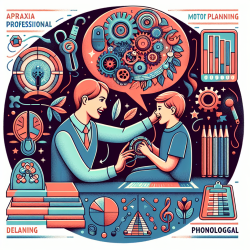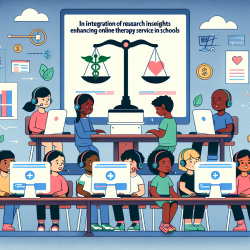Introduction
As practitioners in the field of speech-language pathology, we often encounter children with a variety of developmental challenges. One area that requires a nuanced approach is the management of Disorders of Sex Development (DSD). A recent international survey of specialist centers, as detailed in the research article "Current models of care for disorders of sex development – results from an International survey of specialist centres," provides valuable insights into the current models of care and how practitioners can enhance their skills to improve outcomes for children with DSD.
The Importance of Multidisciplinary Teams
The survey highlights the critical role of multidisciplinary teams (MDTs) in the management of DSD. These teams typically include specialists in endocrinology, surgery/urology, clinical psychology, radiology, and nursing. The presence of such teams ensures comprehensive care and support for children and their families. However, the survey found that only 41% of centers could assemble a complete MDT during the initial evaluation of a newborn with suspected DSD.
For practitioners, this underscores the importance of advocating for and participating in MDTs. By collaborating with other specialists, speech-language pathologists can contribute to a holistic approach that addresses not only the physical but also the psychological and social aspects of DSD.
Leveraging International Networks
One of the key findings from the survey is the high level of international collaboration among DSD centers. This interaction facilitates the sharing of data and best practices, which can significantly enhance the quality of care. Practitioners are encouraged to engage with these networks, such as the International DSD Registry (I-DSD) and DSDnet, to stay informed about the latest research and developments in the field.
Participation in these networks can also provide opportunities for professional development and access to resources that may not be available locally. For example, next-generation sequencing and other advanced diagnostic tools are becoming increasingly common in specialist centers, and being part of an international network can facilitate access to these technologies.
Implementing Research Findings
The survey results indicate a shift towards molecular genetics for routine diagnostics in DSD. Practitioners should consider integrating genetic testing into their diagnostic processes, where appropriate, to improve accuracy and outcomes. The survey found that genetic tests were preferred over biochemical tests for diagnosing certain conditions, such as 5-alpha reductase deficiency.
Additionally, the survey highlights the need for ongoing professional development and participation in educational programs. Practitioners should seek out opportunities to attend local, national, and international events related to DSD to enhance their knowledge and skills.
Conclusion
In conclusion, the survey provides a comprehensive overview of current care models for DSD and offers valuable insights for practitioners looking to improve their skills. By participating in multidisciplinary teams, engaging with international networks, and implementing the latest research findings, practitioners can enhance their ability to provide high-quality care for children with DSD.
To read the original research paper, please follow this link: Current models of care for disorders of sex development – results from an International survey of specialist centres.










